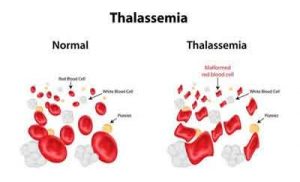- Home
- Editorial
- News
- Practice Guidelines
- Anesthesiology Guidelines
- Cancer Guidelines
- Cardiac Sciences Guidelines
- Critical Care Guidelines
- Dentistry Guidelines
- Dermatology Guidelines
- Diabetes and Endo Guidelines
- Diagnostics Guidelines
- ENT Guidelines
- Featured Practice Guidelines
- Gastroenterology Guidelines
- Geriatrics Guidelines
- Medicine Guidelines
- Nephrology Guidelines
- Neurosciences Guidelines
- Obs and Gynae Guidelines
- Ophthalmology Guidelines
- Orthopaedics Guidelines
- Paediatrics Guidelines
- Psychiatry Guidelines
- Pulmonology Guidelines
- Radiology Guidelines
- Surgery Guidelines
- Urology Guidelines
New drug reduces need of blood transfusion in Thalassemia : BELIEVE study

U.S.A: New drug that reduces the need for blood transfusion in thalassemia has been developed. According to a new study , luspatercept significantly reduced the need for blood transfusions in adult patients with beta-thalassemia. The study found that 70% of patients treated with luspatercept were able to reduce blood transfusions by at least a third over any consecutive 12-week period. The results of phase III BELIEVE study was presented at the 2018 American Society of Hematology Annual Meeting & Exposition.
Luspatercept is a “first-in-class erythroid maturation agent under development for the treatment of adult patients with beta-thalassemia or MDS [myelodysplastic syndrome] associated anaemia. The experimental drug acts by binding selectively to members of the TGF-beta superfamily of ligands, which has the downstream effect of enhancing late-stage erythropoiesis, by attenuating dysregulated Smad2/3 signalling.It is the first novel approach designed to repair this red blood cell (RBC) maturation defect to restore—and increase—RBC production. As a ligand trap, it works by targeting specific TGF-beta proteins involved in late-stage red blood cell maturation. Scientists believe that luspatercept has the potential to be transformative for patients with serious RBC disorders by significantly reducing or eliminating the need for frequent and lifelong blood transfusions.
According to the presenter of the study, Dr. Cappellini, adoption of luspatercept in the therapeutic management of beta-thalassemia patients will also impact the possibility of reducing the multimorbidities that patients experience due to iron toxicity. Iron accumulates by blood transfusions, and it causes organ damage if not removed by daily iron chelation.
The study involved 336 adult patients (median age 30 years) from 65 sites in 15 countries who had beta-thalassemia and who required regular red blood cell transfusions and randomized them to receive either luspatercept (n = 224) or placebo (n = 112), both administered by injection every 3 weeks. Patients who received luspatercept during the trial received a starting dose of 1.0 mg/kg, titrated up to 1.25 mg/kg.
Patients were followed over the course of 48 weeks in a double-blind format, with investigators tracking the number of units of blood that each study participant required. Prior to enrollment, participating patients required a median of 6 units of blood over a 12-week period.
Read Also: Treatment of Anemia In Pregnancy- Indian Guidelines
The study found that by the final quarter of the trial follow-up period (weeks 37–48), 19.6% of patients had reduced their number of transfusion units required by at least one-third, compared with 3.6% of patients receiving placebo.
Moreover, by the same period, as many as 10.3% of patients had reduced their number of transfusion units by at least half, compared with 0.9% of patients receiving placebo.
Commonly observed adverse events were bone pain and thrombotic events, including stroke; however, adverse event rates were not significantly different between the luspatercept and placebo groups.
Beta Thalassemia is an inherited blood disorder They are forms of thalassemia caused by reduced or absent synthesis of the beta chains of hemoglobin that result in variable outcomes ranging from severe anemia to clinically asymptomatic individuals.

Disclaimer: This site is primarily intended for healthcare professionals. Any content/information on this website does not replace the advice of medical and/or health professionals and should not be construed as medical/diagnostic advice/endorsement or prescription. Use of this site is subject to our terms of use, privacy policy, advertisement policy. © 2020 Minerva Medical Treatment Pvt Ltd